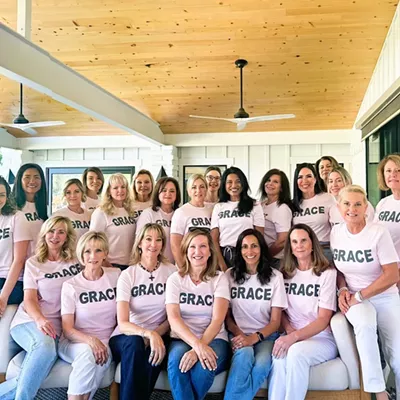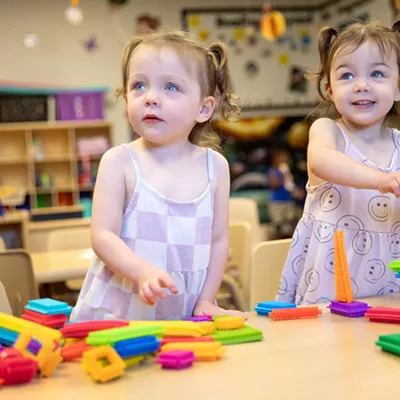It's been about one year since Planned Parenthood Arizona got involved in the Tucson Teen Pregnancy Prevention Coalition—an initiative that, among other goals, is bringing sex education to Sunnyside Unified School District by this fall.
At the end of January, the organization announced the launch of another project in the region to promote low-maintenance and longer-term birth control options, such as IUDs and other intrauterine devices, among girls between 15 and 17 years old. The program comes with much-needed hope to reduce teen pregnancy rates in the state, as Arizona's numbers are still higher than national average.
The project in Southern Arizona is modeled after a similar program in Colorado, where teen pregnancies dropped by nearly 40 percent, and abortions by 42 percent, between 2009 and 2013, according to the Colorado Department of Public Health and Environment.
During the months leading up to what will be a three-year outreach plan—a partnership between Planned Parenthood and the Women's Foundation of Southern Arizona—there were a series of group discussions for teens to talk birth control and how it relates to their long-term goals, for instance pursuing higher education.
"'Where do I want to be a year from now, with respect to my education, a job, saving money for school?' They weren't really thinking about birth control in the context of achieving even mid-term life goals," says Planned Parenthood Arizona President and CEO Bryan Howard. "[The young women in the group sessions] didn't get this information at school, most of them were not having these conversations at home with their families or their parents, and when they went online they weren't finding a whole lot of sites that talked about sex ... [from the perspective] of younger women or in a holistic way."
Although the figures have significantly decreased since the early 2000s, girls younger than 17 still account for roughly 7.4 percent of teen pregnancies in Pima County, according to a 2013 Arizona Department of Health Services report. Also, between October 2013 and September 2014, of the more than 5,500 patients who visited the two Planned Parenthood centers in Tucson, at least 15 percent were teens seeking contraception, STD screening and treatment, as well as abortions, Planned Parenthood says.
The issue with contraceptives like birth control pills is that it's common for women to forget taking them daily. Once an IUD is inserted, not only can it prevent pregnancies from three to more than 10 years, but it's also more discreet and there's no need for reminders. For these reasons, the popularity of IUDs, and other long-term, intrauterine contraceptive methods, is increasing, especially among millennials.
Lately, there is an "obsessive political debate about abortion, and really it has overwhelmed and stopped discussion of birth control and prevention in the first place," Howard says. "Our belief is we have to refocus on discussing ... contraception, and placing it in the context for young women and young couples to try and bring through and overcome the political debate about abortion, because the discussion of contraception has gotten lost."
Since teen pregnancies are more common among low-income Hispanic and African-American women—two communities that tend to have conservative views regarding sex-ed and access to birth control—Planned Parenthood is taking advantage of its partnership with Sunnyside.
The school district, which is mostly Hispanic and Latino, has been hosting parent and student forums as it prepares to launch curricula for classes that will teach sexual health in 8th and 9th grades. The meetings are a chance to hear parent concerns and spread the word on information that's key to preventing unwanted pregnancies.
Cost-wise, the IUDs and implants will either be covered by insurance, or free of charge for uninsured girls thanks to funding from the nonprofit Arizona Family Help Partnership, Howard says.
Tucson Teen Pregnancy Prevention Coalition
Sunnyside, Planned Parenthood Arizona, Child and Family Resources and Teen Outreach Pregnancy Services were awarded in spring 2015 a joint $4.3 million grant from the U.S. Department of Health Services' Office of Adolescent Health to create middle and high school health-ed curricula based on abstinence, but that also teaches about safe sex.
As of now, the school district offers classes that teach only the reproductive side of sex.
Beginning in the fall, according to a Sunnyside spokesperson, the new 16-week curricula will be incorporated in science and health classes in 8th and 9th grades at certain schools. For children who attend a charter school within the district's boundaries, there will be classes taught at community centers on the weekends or after school, says Daniela Canjura, pregnancy health educator and case manager at Teen Outreach Pregnancy Services.
Due to state law, the school district will require parents to sign a permission slip for their children to be part of the classes. The courses—called Mobilization for Positive Futures—won't revolve around sex, rather they will focus on health and wellness, which includes knowing how to be responsible while sexually active, says Marie Fordney, director of The Grrrls Project at Child and Family Resources and leader of the upcoming program at Sunnyside.
"We have found the Sunnyside community to be very receptive of this program, because parents and the administration are all focused on the success of their kids," she says. "[Making] sure they are headed to a positive future ... graduation, a successful career, [and] avoiding unnecessary obstacles, [such as] unplanned pregnancies."
Fordney says the curricula she helped write use evidence-based medical information that is continuously reviewed, as well as national programs that are proven effective with teens. And the parent and student forums will help make the curricula specific for Sunnyside and the needs of that community.
The program is currently under a public input process, Fordney says. Parents can visit Sunnyside's administrative office, read up on the content that will be offered starting next school year, and give their feedback.
"[We're] creating awareness around the community about how parents talk to their children about the duality in sex," Canjura says, adding there will be parent-child workshops in the future, where a facilitator will help both sides communicate issues like sex and contraceptives.
The federal grant is meant for the next five years, but Canjura says she hopes teachers will continue to incorporate comprehensive sex-ed beyond that.
"We are not teaching children how to have sex. It is more about what their options are out there [for] healthy relationships, [and also] easing a parent's concerns about all those things," Canjura says.








